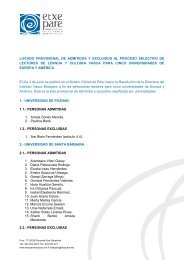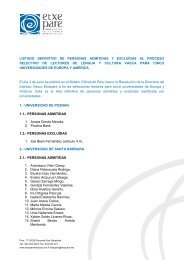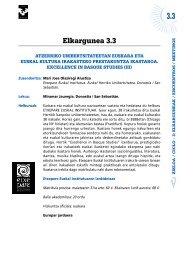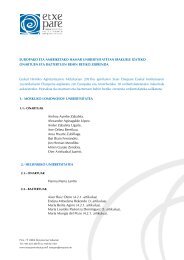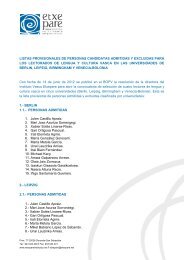Euskal sukaldaritzaz - Etxepare, Euskal Institutua
Euskal sukaldaritzaz - Etxepare, Euskal Institutua
Euskal sukaldaritzaz - Etxepare, Euskal Institutua
You also want an ePaper? Increase the reach of your titles
YUMPU automatically turns print PDFs into web optimized ePapers that Google loves.
Acabo de escribir que esta cocina nueva de los cocineros<br />
más actuales es apreciada por todo el mundo,<br />
pero uno de los grandes, Hilario Arbelaitz, del Zuberoa<br />
de Oiartzun, 10 se preguntaba en una ocasión, si<br />
los cocineros vascos son conocidos gracias a la cocina<br />
vasca de siempre, o si son apreciados por lo nuevo<br />
que han sabido aportar.<br />
Arbelaitz es, desde mi punto de vista, el que más se<br />
aferra a eso que llamamos memoria del reconocimiento,<br />
sin embargo él concluye que si los cocineros<br />
vascos son estimados por gentes de otros países, lo<br />
son gracias a la novedad que han sabido insuflar en<br />
su cocina de autor. Eso sí, una novedad muy particular<br />
y que sólo es posible en relación profunda con la<br />
cocina tradicional vasca.<br />
Sin embargo, no queremos llevar a nadie a engaño.<br />
No es más que una opinión, pero la novedad no es<br />
siempre bien recibida cuando de asuntos del comer<br />
se trata, al menos entre vascos. Supongo que ocurrirá<br />
lo mismo en otros lugares y culturas, pero lo cierto<br />
es que aquí mucha gente se resiste a abandonar<br />
la cocina tradicional todavía. Cada vez que acude a<br />
un restaurante, persigue la repetición del placer de<br />
comer aquello que le es conocido, negándose a experiencias<br />
demasiado radicales en su novedad.<br />
Pero ¿por qué hemos de andar siempre eligiendo entre<br />
nueva cocina y tradicional, como si una negara a la<br />
otra? Además, surgen más preguntas: ¿Cómo ha de<br />
ser una cocina para ser considerada tradicional? ¿Qué<br />
particularidades la definen? ¿Cuál es esa cocina, la<br />
que hemos visto toda la vida como inmutable a pesar<br />
de haber evolucionado sin cesar, la de hace 300 años,<br />
la de hace 400…? Lo mismo ocurre con la nueva. ¿Qué<br />
es cocina nueva y qué no? ¿Todo vale si es nuevo..?<br />
¿Qué significa cocina de siempre? ¿Existe realmente?<br />
Nadie pondrá en cuestión que el trasunto de la memoria<br />
es fundamental en gastronomía. Si un plato,<br />
una comida, un sabor es reconocido con agrado<br />
–porque lo identificamos con un entorno o un tiempo<br />
plácido, por ejemplo–, tiene todas las probabili-<br />
I have just written that this new cuisine by the most<br />
up-to-date chefs is treasured all over the world but<br />
one of its major exponents, Hilario Arbelaitz, owner<br />
of Zuberoa in Oiartzun, 10 asked on one occasion if<br />
Basque chefs were well-known because of traditional<br />
Basque cuisine, or treasured for the novelties they<br />
have been able to contribute.<br />
Arbelaitz is, in my opinion, one of the best examples<br />
of someone who has grasped the idea of what<br />
is known as the memory of recognition, yet he himself<br />
acknowledges that if Basque chefs are held in<br />
esteem by people from other countries, it is due to<br />
the novelty they have understood how to introduce<br />
into their signature cuisine. Having said that, this is<br />
a very specific kind of novelty and one that is only<br />
possible through a profound connection with Basque<br />
traditional cuisine.<br />
However, I don’t want to mislead anyone. It is only<br />
an opinion, but novelty is not always received so well<br />
when it comes to eating, at least amongst Basques.<br />
I suppose the same is true in other places and cultures,<br />
but it’s true that many people here still refuse<br />
to abandon traditional cuisine. Every time they go to<br />
a restaurant, the repetitive pleasure of eating what<br />
is known persists, refusing to experience too many<br />
drastically novel things.<br />
Yet why should we always have to choose between<br />
new and traditional cuisine, as if one contradicts<br />
the other? Further questions spring to mind: What<br />
makes a cuisine traditional? What specific elements<br />
define it? What is that cuisine, one that we have understood<br />
as unchanging throughout our lives despite<br />
having endlessly evolved, of three or four hundred<br />
years ago? The same thing occurs with new cuisine:<br />
What is and what isn’t new? Is everything good<br />
so long as it is new? What does traditional cuisine<br />
mean? Does it really exist?<br />
No one doubts that maintaining memory is vital in<br />
gastronomy. If a dish, food or a flavour is recalled<br />
with pleasure –because we associate it with a relax-<br />
29



